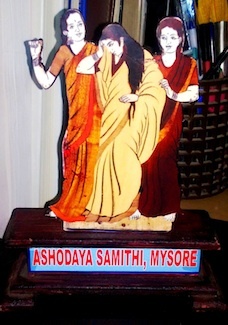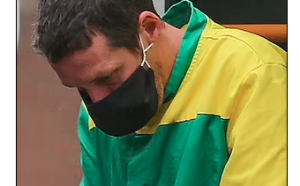In 2004, a handful of women visited Sonagachi in Kolkatta’s Shobha Bazar-Beadon Street area, the largest red-light district in India and Asia lined with several hundred multi-story brothels and an estimated 13,000 sex workers. In Sonagachi, they also found several NGOs and government organizations operating for the prevention of sexually transmitted diseases including HIV/AIDS. The Sonagachi Project, run by Durbar Mahila Samanwaya Committee (DMSC), focuses on the empowerment of sex workers to insist on condom use and stand up against abuse. They observed lobbying efforts to recognize sex workers rights, a cooperative bank, micro-loans, and literacy and vocational programmes. They began thinking of how things were back home. The seed had been sown.
These women, who were sex workers themeselves, hailed from a small town in southern India, Mysore. When they got back home, they held a series of meetings. They sensed the need to come under one umbrella. From a faceless, voiceless community which had no self-esteem, they aspired to live differently. The handful sex workers of Mysore together laid the foundation stone of what is today known by the name of Ashodaya Samithi.
When they first began, sex work in Mysore was vibrant and mostly street-based. Condom allocation and availability was nil. There was just one Integrated Counselling and Testing Centre (ICTC) where the counsellor said he was seeing new HIV infections every month. To ensure sex workers use condoms, it was necessary to provide awareness of HIV/AIDS and Sexually Transmitted Infections (STI) to them, and provide condom and STI services. Added to this, there lay the himalayan task to overcome the power dynamics behind the sex workers’ helplessness to make clients use condoms.
The stigma was high. Violence from clients, goondas meaning hired thugs/rogues/hoodlums, police, and boyfriends posed a grim threat. All the money earned was taken away (by clients who stole it from them, boyfriends who tried to live off their earnings, police who exchanged money for releasing them from spontaneous arrests) and they often had no savings. Sex workers did not have bank accounts because every bank asked for identity and proof of address, something sex workers do not possess, largely owing to their high mobility. More and more sex workers were getting infected with HIV and were without sufficient information on its prevention, care and support. There was high incidence of violence against them and the vagueness of the law on sex work fueled the frequency. Sex workers did not have a reason to associate with others within the community. They were left on their own, with their small immediate groups, to fend for themselves.
Ashodaya Samithi changed all that.
What started as a sex workers community based organization, is today a powerful collective constituting of 336 members who are female, male and transgender sex workers as well as a network of volunteers operating in six districts of Karnataka. It reaches out to 8,000 sex workers through its different initiatives of empowering the community, such as providing knowledge of legal and human rights, HIV/STI knowledge to bring about a behavioural change, supporting the prevention and treatment of STIs and HIV, running drop-in-centres, operation of a crisis management unit, a restaurant, service apartment and a training academy predominantly run by members.
The HIV programme run by the collective focuses on two separate strategies: prevention through the encouragment of condom use and frequent visit to clinics for the uninfected, and treatment for infected sex workers provided in government hospitals and in Anti Retroviral Therapy (ART) centres. Their drop in centres look like a community club, but besides offering a safe space for the community to interact with others, rest and hold meetings, they also offer HIV and STI testing facilities, counselling and free condoms. For the sex workers who do not come to these drop in centres, Ashodaya uses a social network approach where those community members who are the most popular and influential are recruited as ‘peer educators’ who in turn help bring in new members and disseminate information of STIs and HIV to sex workers.
There are 650 female sex workers infected with HIV in Mysore alone, and Ashodaya makes it their goal to reach every woman to give information on HIV care and treatment, assist her in attending the Anti Retroviral Therapy (ART) centre, and follow up on her progress to ensure she takes the medicines and adheres to the treatment. Additionally, Ashodaya finances her trips to the hospital and counsels her on the use of condoms. Those whose HIV status is unknown are reached by peer educators and engaged in discussion on HIV to bring about change in terms of their risky behaviour, and encouraged to come to get tested at the drop in centre or testing centres in hospitals. Most of all, it aims at lowering the stigma associated with the life of a person living with HIV, attempting to create an enabling environment conducive to the well being of the sex worker.
This exercise has had a direct and steep impact; 90 percent of sex workers in Mysore have been contacted monthly, 70 percent of them have visited drop in centres regularly and 65 percent have become consistent condom users. Ashodaya Samithi has successfully reduced STI prevalence within three years from inception.
The collective has worked beyond simply providing information on HIV, STIs, and condoms to thinking and working towards their sustainability beyond the projects funded by donors. Reduction of stigma happened as a by-product of their efforts. For example, Hotel Ashodaya is a restaurant run by sex workers and a share of the profit is used to run the community care centre. The idea of starting a restaurant was a deliberate and innovative approach to address stigma faced by sex workers. “The restaurant has given us an opportunity to interact with people from mainstream society and has improved their understanding of our issues. From the sales that has gone up by 50 percent over the last year, it shows that people come to the restaurant knowing it is run by sex workers,” one sex worker tells me.
The Community Care Home is where Ashodaya gives shelter to sex workers infected with AIDS, treating and caring for them. They receive free clinic facilities, three meals a day, hot water for bathing and a space devoid of the stigma that would have faced in a general government hospital. A sex worker tells me, “ A sex worker could go to a government hospital and get all the HIV and STI related health services and need not necessarily go to Ashodaya had it not been for their crisis management program.”
What is interesting is that the sustainability of the care home is provided by resources generated by the women on their own, from the restaurant and from fund mobilization.
“Initially managing resources was difficult. We all sat together to discuss our options. We thought it was a good idea to approach the local people in the vicinity. We raised money for our food and other basic requirements. There are many good-hearted people out there,” one patient says.
Phone numbers are given to the community members which serve as help lines for a sex worker in distress. The crisis team responds to the situation and help is extended. This has provided a feeling of unity in the community of sex workers and there has been a 70 percent drop in violence. Most of all this has facilitated more sex workers to join Ashodaya, visible from a recorded 80 percent registration.
Ashodaya Samithi is a success story of a sex worker led, community based organization in India, which is strengthening community members to fight HIV. They have changed the landscape of the living conditions of sex workers in every aspect. People from different parts of the world are flocking to Mysore wanting to learn about the program and many go back and try replicating it in their own country. Ashodaya embraces this sharing. Besides building the capacity of its own community, it has gone ahead to build the capacity of others creating a large network with a sole vision and goal – to secure a better life for sex workers.
The adult industry was not invention of today’s sex workers. They are service providers of an age-old industry, culturally accepted from time immemorial. They are aware of their right to justice, safety, privacy, dignity, livelihood, health and education of their children. They want to play an important part in preventing the spread of HIV among themselves, their clients, spouses and their children.
Ashodaya dedicates its projects of HIV prevention to the 452 sex workers who were a part of the Community Based Organization since its formation but who died of AIDS. In every forum when a community leader gets up to talk, these men and women are remembered and valued even today.
“We strive to achieve, united by our sense of togetherness,” are more than just beautiful words on the wall but a value pulsating in every sex worker touched by Ashodaya.
Source






